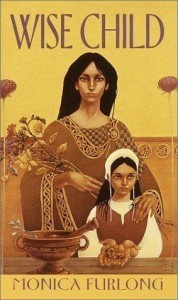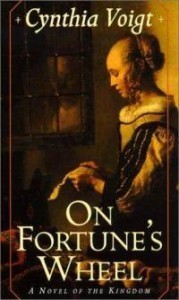How Can Reading About Housework be so Fun?
 Between my vacation and the sad news I’m soon to be moving, I have piles and piles of housework and packing to do in the next month. Naturally the first thing I did was grab a book to sit on the couch with and read. In the stack of books from my aunt, were two very pleasant books I’d seen before at the library in junior high, but never gotten around to read, “Wise Child” and its prequel “Juniper” both by Monica furlong.
Between my vacation and the sad news I’m soon to be moving, I have piles and piles of housework and packing to do in the next month. Naturally the first thing I did was grab a book to sit on the couch with and read. In the stack of books from my aunt, were two very pleasant books I’d seen before at the library in junior high, but never gotten around to read, “Wise Child” and its prequel “Juniper” both by Monica furlong.
One fascinating thing about both books, is how much house and yardwork the characters do. Living in medieval times in the English and French countryside I’m sure did involve hours and hours of labor collecting and preparing food and medicines. And yet, reading about it, the most incredible thing is it’s not boring. Instead I feel almost live I’ve been productive myself, hearing about the toiling and exhausted characters surveying their now clean houses and stocked larders. I feel energized and gratified… the only downside, is my kitchen is still a horrible mess.
It’s something I’ve noticed before, much to my surprise. Daily work in a novel can be quite enjoyable and draw a person into the world and story. In several novels, I’ve noticed some of my favorite parts are where the character is toiling day after day at some kind of hard or boring labor. It would see a contradiction… I really hate housework, so why is it so fun to read about?
I’m not really sure I even have the answer to that. I think it must lie in the skill and craft of the authors and their narration. First, it seems detail and specifics are key here. I have no idea if Furlong was at any point an housewife, but she certainly knows her material when it comes to cleaning houses and collecting and processing plants. As a reader, it’s fascinating to hear how people did tasks in older times. The flowing narration is able to both teach and spark the imagination so that I’m not bored.
Second, in both books the main character complains, while a more experienced mother/teacher figure offers a perspective on how daily work is part of our existence and important to the rhythm of life. This resignates both with my inner complaining child (No! Don’t make me do the dishes!) and my older practical adult (I need these washed now so I won’t have to do it right before dinner when I’m busy cooking.) It also keeps up a strong character dynamic through the scenes, and gives a sense of satisfaction when the main character grows and realizes she’s equal to the work, that it her mentor is right about it being part of the flow of life, and that she’s stronger than she thought she was.
 Still, even picking out the elements, it takes a good deal of skill to have quite so much description of work as in “Wise Child” and never bore the reader. I’ve only read one other book with quite that much housework: Cynthia Voigt’s “On Fortune’s Wheel.” I liked that book just as much, the housework scenes being the best part. Similar to “Wise Child” we have a character who doesn’t like work, realizing it’s place in her life and growing and changing as she discovers how to do the housework, and every page is fascinating.
Still, even picking out the elements, it takes a good deal of skill to have quite so much description of work as in “Wise Child” and never bore the reader. I’ve only read one other book with quite that much housework: Cynthia Voigt’s “On Fortune’s Wheel.” I liked that book just as much, the housework scenes being the best part. Similar to “Wise Child” we have a character who doesn’t like work, realizing it’s place in her life and growing and changing as she discovers how to do the housework, and every page is fascinating.
And the longer I think about, the more intriguing the whole thing is, the more books I can think of that use this devise, and the more interested I am in trying it out in my own writing. Here’s some other books that use this tactic to great effect:
“Jackaroo” (also by Cynthia Voigt) which has nearly as much work, but with a different character dynamic, the MC is industrious, while other characters around her are lazy. She also uses it to handle her emotions when dealing with things, both which keeps interesting tensions and character growth during the scenes. To a lesser extent the other books in the series will show work too.
“The Wise Woman” (George McDonald) which follows a very similar story of an older woman trying to apprentice (in this case two) young girls to teach them about the world and make them face their inner life. One girl is lazy, the other industrious but narcissist, making for a fascinating comparison as we watch both girls struggle.
“Alanna the First Adventure” (Tamora Pierce) and to a larger extent “Protector of the Small” Pierce’s series about Kelardy, since there’s more physical work and far less magic in those books. A lot of daily life in training for knighthood features in these books, exercises, tests, trials, making you feel sore, exhausted, but also exhilarated with the main character as her skills improve.
“A Conspiracy of Kings” (Megan Whalen Turner) has a section in the first third of the book, and incidentally my favorite part, where the MC is working hard and long days as a field laborer. Character development and his slowly developing relationship with the community keep the tension humming.
“Holes” (Louis Sachar) which makes having to dig a hole ever day actually interesting. More humorous than the others, it still cleverly uses lots of hard work to define character development.
I’m sure there’s more that I haven’t thought of that I’ve enjoyed… reading about all this works makes me want to try writing about some. Too bad what I’m actually supposed to be doing is vacuuming, my floor is disgusting. Sigh.



